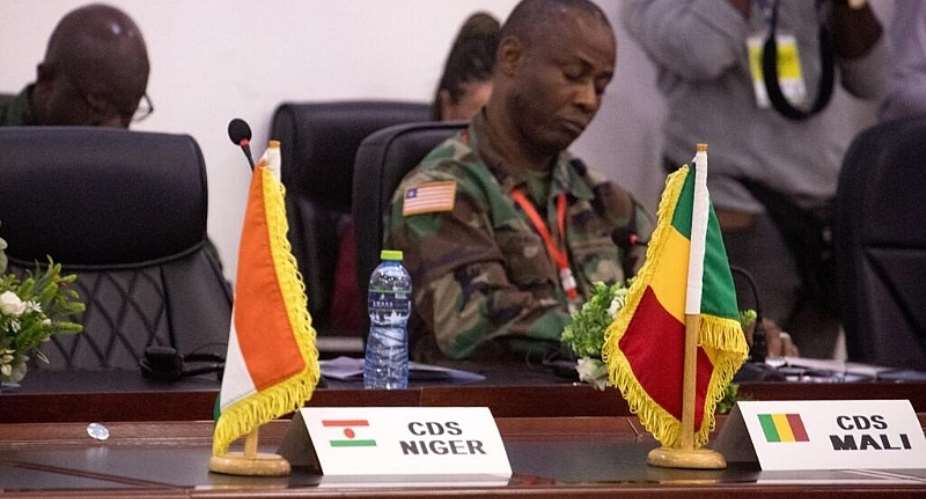The withdrawal of Niger, Mali and Burkina Faso from the West African economic bloc triggered strong reactions among the group's members, with some promising to reverse the Sahel countries' decision before it is too late. But some are already questioning whether the organisation can survive the split.
Mali and Burkina Faso sent "formal notice" of their withdrawal from the West African blocEcowas on Monday. Niger followed on Tuesday.
The notes came from the military regimes in all three countries, who had announced plans to withdraw from the bloc on Sunday, accusing it of posing a threat to their sovereignty.
The main reason for the withdrawal appears to have been the heavy sanctions imposed by the regional group on the three countries following the military coups that overthrew elected civilian governments.
Ecowas officially replied in a statement that it was awaiting "formal and direct notification" from the countries.
But most members are already trying to undo the withdrawal, especially Africa's giant Nigeria, the most populated nation on the continent, which currently presides tthe bloc.
A weaker Ecowas, a stronger AES?
If the three juntas do leave Ecowas, the economic group would lose important contributors, notably in cattle and food, as former Benin's prime minister Lionel Zinsou told RFI.
Economically, most Ecowas countries "are interdependent" according to experts.
The trio had formed the Alliance of Sahel States (AES) in September to fight jihadist groups, which will now serve beyond a simple military framework.
Their goal seems to reinforce their Alliance, not only militarily, but also politically and economically.
"The AES is based on a treaty for a collective security alliance, to support each other in case of aggression," international law researcher Julien Antouly told RFI. "We can imagine it evolving into an economic cooperation, a diplomatic alliance, to form a real bloc and act as a counterweight to the other Ecowas states."
Captain Ibrahim Traoré, the current leader of the junta in Burkina Faso, also told journalists the countries were thinking of leaving the common currency of West Africa, Franc CFA, considered by many as a negative and detrimental legacy of colonialism.
Challenges on all sides
The three countries' withdrawal will not come without challenges.
First, under the bloc's statutes, withdrawal can't take effect for at least a year after official notification.
Then, if confirmed, it would affect the movement of goods and populations, citizens risking losing their right to travel freely without visas for 90 days within the rest of the bloc, and to trade without adding taxes.
Mali, Burkina Faso and Niger were founding members of Ecowas in 1975, which also included Togo, Benin, Côte d'Ivoire, Ghana, Senegal, Sierra Leone, as well as Nigeria.
The three nations also lack access to the sea, and without cooperation from neighbouring Togo and Benin could lose their connection to any port, even though Morocco has offered to help on that matter.
Some experts have described the withdrawal as evidence of the three juntas' fragility.
But according to the Timbuku Institute, it also "represents a clear regression in the security situation of the Ecowas region as a homogeneous area of collective security cooperation, where the risks and threats of inter-state conflict had been virtually eliminated.
Mediation mission
Sierra Leone has also reacted strongly. Timothy Kabba, its foreign affairs minister, is part of the Ecowas mediation mission in Niger. He told RFI this decision poses a threat to the peace, security and stability of the entire community.
"Ecowas has to ensure that these important members of our community do not withdraw and leave the community, he said. "They are facing not only their political instability, but also terrorist groups like the al-Qaeda movement and Daesh," Kabba added, "therefore it is a bit worrying if these countries go it alone."
Togo sent on Monday its Territorial Administration minister Hodabalo Awaté to Niamey, to meet Niger's transitional authorities. He hasn't communicated on the outcome yet.
Heads of states are currently discussing two options: an extraordinary summit in Abuja, Nigeria, maybe even this weekend, or a meeting of Ecowas heads of state at the next African Union summit in Addis Ababa mid-February.
But for Babacar Ndiaye of the Timbuku Institute, "France and Ecowas were at the receiving end of AES diplomatic slaps in the face. So, the question is now 'who is next in the line'? Not if they can amend their relations with current West African regimes.





 Two off-duty Police Officers shot by unknown gunmen on motorbike at Trasacco
Two off-duty Police Officers shot by unknown gunmen on motorbike at Trasacco
 Let’s fight monetisation of our democracy- Abu Kansangbata
Let’s fight monetisation of our democracy- Abu Kansangbata
 Prof Jane Naana Opoku-Agyeman attends central regional NDC meeting
Prof Jane Naana Opoku-Agyeman attends central regional NDC meeting
 Investigations into Cecilia Dapaah’s scandal not closed – AG
Investigations into Cecilia Dapaah’s scandal not closed – AG
 Austin Gamey criticizes gov't review of labour act
Austin Gamey criticizes gov't review of labour act
 Cecilia Abena Dapaah’s case incomplete without FBI’s finding – Edudzi Tameklo
Cecilia Abena Dapaah’s case incomplete without FBI’s finding – Edudzi Tameklo
 I’ll give ‘Kayayei’ workers tricycles if elected President – Dr Ankrah
I’ll give ‘Kayayei’ workers tricycles if elected President – Dr Ankrah
 Bawumia commissions first phase of Appiatse reconstruction project
Bawumia commissions first phase of Appiatse reconstruction project
 Nti fertilizer was not submitted for testing — Witness in Opuni’s trial confirms
Nti fertilizer was not submitted for testing — Witness in Opuni’s trial confirms
 Family of Ghanaian fishery observer demand answers months after his death
Family of Ghanaian fishery observer demand answers months after his death
